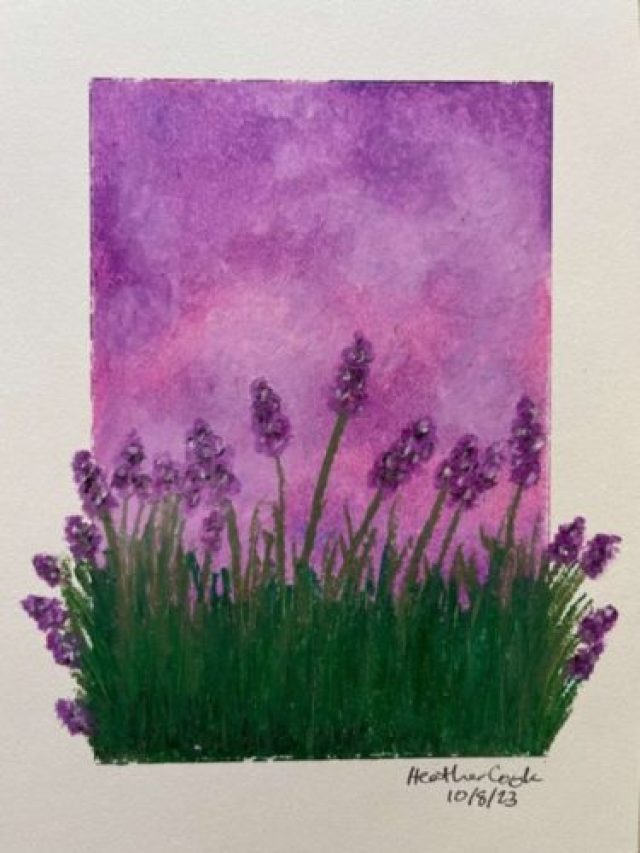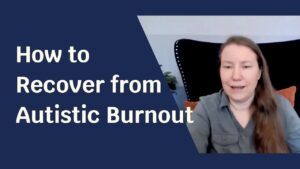Avoiding art
Last week, I promised to share my real time experiences of doing something that has spiked my anxiety for decades: art. So here goes:
Recently, I’ve been getting an urge to do some art. It’s popped up in short bursts throughout my life, with looong stretches in between, and is always quashed pretty quickly by massive anxiety flareups.
But recently I found an old box of oil pastels and decided to finally conquer this very long lived art anxiety.
(Because this is my second chance life, and I can try old things again for the first time.)
I’m also taking a long weekend, so this seemed like a good time. Friday morning, I had planned on doing art first thing, but instead I decided to do an errand that I didn’t absolutely have to (not like me) and didn’t get home until 1 PM. I start to suspect that I’m avoiding the art.
After lunch, I spent a couple hours tidying my very tidy office, debate where to hang a picture, arrange my few art supplies in and out of different containers, plan out where I’m going to do the drawing, play with a fidget, debate whether to learn from YouTube or to sign up for a month free trial of Skillshare, check my email. I’m definitely avoiding starting art.
I open this document and start writing this for you. It’s not lost on me that this is both useful and another way to avoid starting.
From here on out, this narration will be in real time.
Finding the issue
Okay, I know that when I force myself to do something, I usually have a terrible experience and build up resistance that makes it harder next time. And I want to create positive associations with drawing so I’ll enjoy this long term. So I’m going to go into my own head to try to figure out what I’m working so hard at avoiding.
All right, what are the painful thoughts here? I’ve explored this on a number of previous occasions, and already know that a big part of it is the idea of running out of supplies. There’s also an element of being wasteful, but running out is more specifically the pain point. As if there’s a fixed amount of paint or paper or thread or fabric or whatever the craft supply is, that can’t be replenished ever, so I’ve got to make it last in case I’ll want or need it in the future.
Also, I’ve got to make sure that whatever I produce is good enough to be worth using up a very small, finite resource, so I won’t ever potentially regret it.
I feel this with all crafts or art to some extent; less with fiber arts, some with paper arts, but it’s very intense with painting and drawing and what is commonly termed fine arts. Now that I’m thinking about this more granularly, that makes sense. My skill level with fiber arts and paper arts is much higher, so it feels less risky. Because I know what I’m doing, I’m not likely to waste as much.
I know, logically, that my skill level is greater in those areas because I have more experience, because I was willing to practice and gain skills, and that if I practiced and gained skills in the fine arts, it would grow my confidence and the fear around wasting resources would lessen. That’s all logical. But this isn’t about logic. So I’m going to set that aside for now, and go back to trying to narrow down the painful thought, and treat it compassionately, logical or not.
Okay, back to having this small, finite, non-replenishable resource. The image in my mind is of a scene from books in which some apocalyptic event or world-wide disaster has happened and people are living by their wits on the remnants of what they can find, scavenge, and Jerry rig from “before.”
News about climate change and threats of large scale disasters might be amplifying that somewhat, but I don’t think that’s the source. This has been around since I was young, at least since my late teens, possibly earlier. I’m having trouble pinpointing it, now that I’m trying.
Okay, so if I were to put the painful thought into a short, succinct sentence, what would that be?
(I switched to my local library’s website for a few minutes to see if they had any books on oil pastels, and placed one on hold. Then checked Paperback Swap, with no luck. I’m back now.)
Okay, the painful thought. Something like, “I’m going to run out.” That’s definitely in the ballpark, but it’s not triggering the intense jolt of recognition in my stomach that I’m used to when I find the core of the painful thought.
So, what am I making it mean that I might run out? What is my mind saying would be the consequence of that?
That I would never get to do art again. But if I keep putting it off, delaying using up the materials, it’ll still be available to me. There’s art in my future. (This is coming together now.) Because that way, I’ll always get to think that I could do it. But if I run out, it’s gone, and it will have been tragically used up on shitty first drafts.
I can feel my throat clenching, and my face wanting to tear up, which is a sign to me that I’ve hit on some intense emotions, which is a sign that I need to pay attention to something in there.
Because I am a master at delayed gratification. I’ve got that one down hard. So maybe it seems easier to that fearful part of me to delay the pleasure and still keep the hope of doing good art in the future, than of doing a bad job, running out, and having to face giving up on that dream.
Yeah, there’s definitely something in that. I can feel my throat clenching, and my face wanting to tear up, which is a sign to me that I’ve hit on some intense emotions, which is a sign that I need to pay attention to something in there.
Working with my anxiety
So is my anxiety trying to protect me from losing hope? It does sort of seem that way. That’s interesting.
Sometimes anxiety is like that. It’s trying to help or protect us, or thinks it can do a better job than us. It’s usually not true, but I do appreciate the perspective that it’s not trying to hurt me, and it’s trying to help. That lets me see us as being on the same side. I don’t have to overcome it.
So as I talk myself through this, noticing that we’re on the same side is helping that clenching and tearfulness to subside.
Now I can start to question that painful thought. Is it true that the few materials I have now are all that I will ever be able to have or get or provide for myself?
The part of me that lived in poverty for a long time wants to default to yes, but the honest answer, the true to my experience answer, is no. Even when I lived in poverty, I managed to get paper and pencils at a minimum, and sometimes nicer art supplies cheaply (I am incredibly resourceful). And I’m very good at making beauty out of crap and junk and even trash.
So no, it is not true that this is all I will ever get.
It’s also not true that I need expensive art supplies that are beyond my means. What I have will probably last for quite a while, and by then I may have found more, and will have a better idea of what I want. I may even be able to afford nicer supplies, a little bit at a time.
So I use the “I’m having the thought…” technique on this painful thought, and notice the intensity fading.
I don’t want to stop there. I want to question each of the painful thoughts I’ve identified, because they are each heads of a hydra that have their own life and their own anxieties.
So is it true that if I use what I have, I will never get to do art again?
Again, no, it is not true that this is my one shot.
And again, I can feel that in my body. I can feel my stomach releasing, and my interest levels rising, and I’m wanting to leave this narration again, but not as a distraction, but because I want to pick up a pastel stick and make some marks.
In fact, this evening I made my first full drawing using oil pastels.
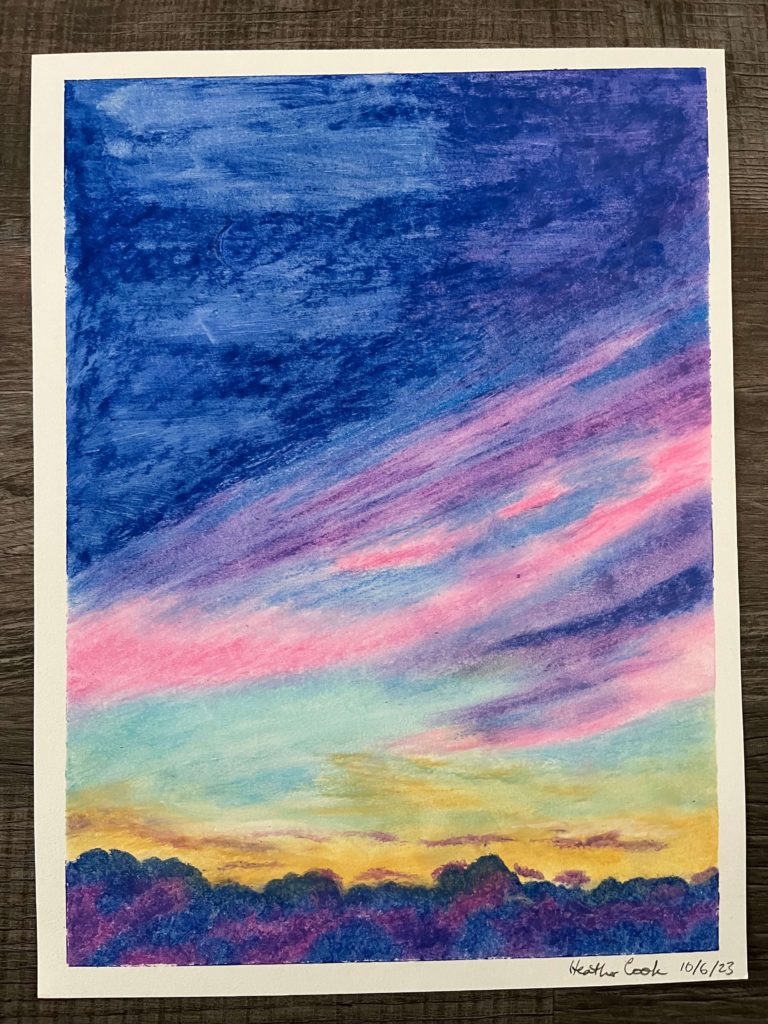
Although part of me wants to say, “good, I’ve cracked it, glad that’s over with,” I’m going to keep with this inner work this a little bit longer, because there’s one more painful thought that I haven’t addressed yet, but that’s been hovering around the edges.
(Interlude: if you’re done reading my personal anxiety deconstruction, and are interested in the course, feel free to skip right to info on that here: Anti-Anxiety Practices for Autistics)
Last week, after finding the box of oil pastels, I did pull out one color and made a few marks on a piece of paper. I literally just scribbled a bit and put it away. Because I didn’t have a plan. And not having a plan, a specific outcome to work towards, is another area of anxiety.
Again, this relates to wasting materials. Because if I don’t have a good enough plan, I’ve used up materials. That thought isn’t feeling as intense anymore, but the need for a plan is still there.
So is it true that I need to have a plan? What if I didn’t?
What is my anxiety saying would be the horrible fate resulting from making lots of unsatisfactory, low quality, meaningless, ugly, or unrecognizable drawings? (I’m intentionally making the sound as bad as possible, to provoke the anxiety into telling me what it’s so damn afraid of.)
Hmm, I’m feeling an, “I’m not good enough” feeling coming up. As if that would prove that I’m not good at something. And that feels like a challenge to my identity.
Which is interesting to me because I don’t have an identity as an artist. I do sort of have an identity as a crafter, but artist feels different in this context, and I’m good at lots of different crafts, so why would my identity be threatened by not being good at art?
My identity is not threatened by doing poorly at other things that I’m not good at. And for the most part, I genuinely don’t mind admitting that I don’t know something. I got over that one a long time ago.
So why does my ego care about being bad (compared to professionals and masters) at the very early stages of learning this particular skill?
Okay, I had to go away and think about this for a while, and I watched a couple of oil pastels for beginners tutorials on YouTube, and that helped me clarify this other painful thought.
If I genuinely didn’t have any experience or skills, and was starting completely from scratch, I don’t think my ego would have any problem being absolutely terrible at it. But my downfall, ironically, might be that I do have reason to believe that I might not be completely crap at fine arts.
As mentioned, I’ve only dabbled in technical drawing a few times in my life, but, for a beginner, I wasn’t that bad at it. In one of my spurts of art inspiration, I took a six week class at a local art museum, just before the pandemic, and got some pretty good results (again, for a beginner) and lots of complements.
So I think there’s a part of me that feels the need to live up to being good at art. But it also knows that it’s not that easy, and a few good-for-a-beginner drawings aren’t going to sustain me for the long haul. The perceived quality of my skills is going to drop dramatically as I attempt harder and harder things (which is almost anything), and my ego doesn’t like that. It wants to see continual improvement, not (perceived) regression.
So, that’s what’s going on inside me, but what’s the painful thought itself?
That I should be good at things? That I have to prove I can do this? That skills should only go up? Those are close, but not quite it.
Again, I’m looking for that jolt of recognition from my body, or an emotional reaction, or any kind of feeling of intensity.
After thinking on this for a while, I think it’s largely loss aversion to not getting praise.
Which I hate admitting, because part of me doesn’t want praise at all, and is averse to getting it. (And part of me hungers for it.)
I also found a fear of liking art too much, and then wanting to spend a lot of money on art supplies, and never having enough.
Clearly, there are several other painful thoughts at play, and narrating through all of them would take a very long time.
Plus, that one about praise is going to take deeper work than the techniques I’ll be presenting in this course, so I’m not going to get into it here. (In fact, I want to schedule a session with my own coach to help me through it, because sometimes having someone to reflect with is incredibly helpful.)
Nevertheless, I want to point out that just the techniques presented in this course, on just these anxieties I worked through with you, got me to a point that I’m making more drawings using oil pastels.
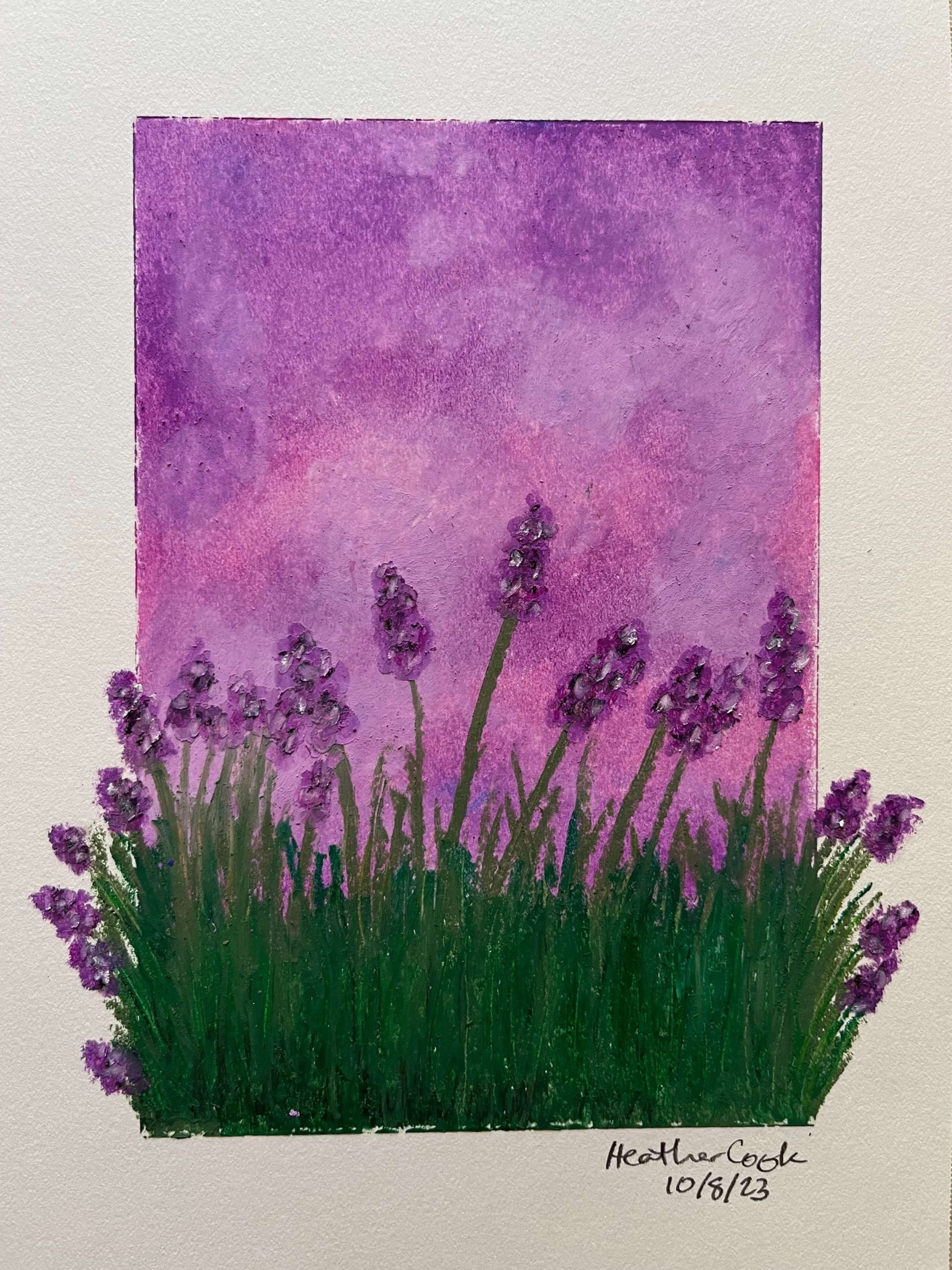
As I do more art, and anxiety reduction work, reducing the internal pressure, allowing even more art, I know from experience that those anxieties will fade more and more.
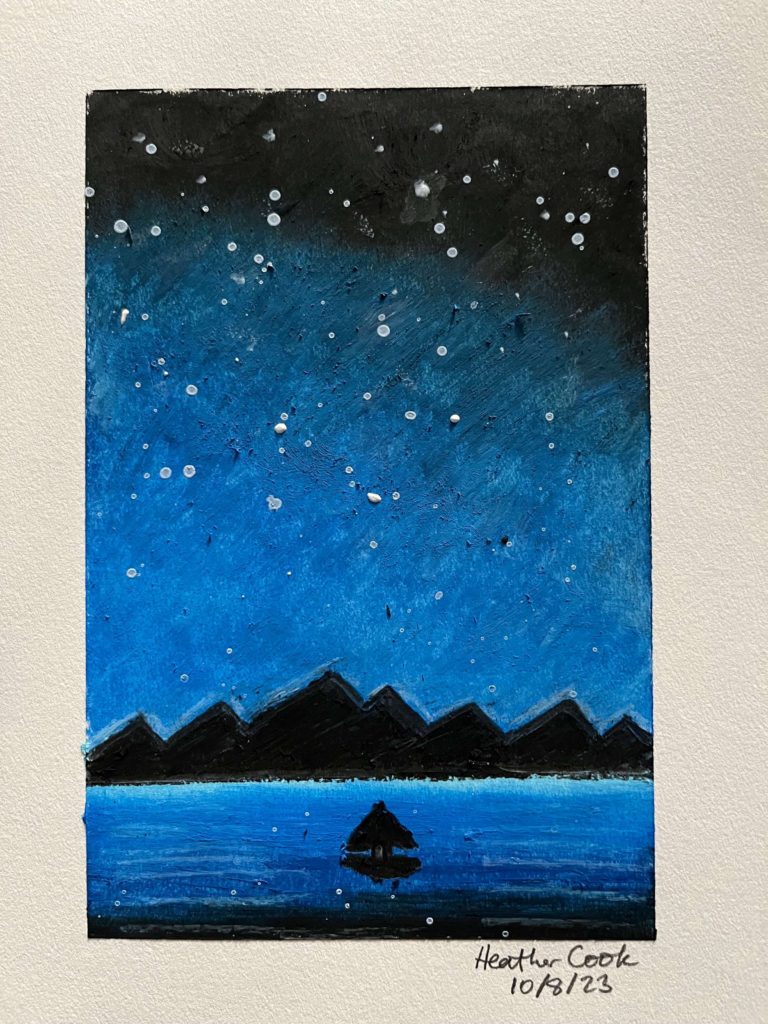
The techniques I used here, of finding the painful thought, questioning it compassionately, and reducing the intensity (as well as several other techniques), are exactly what I’ll be introducing in my anti-anxiety course next month.
They’re not hard to learn, but they do take a while to refine and get comfortable with. Which is why practicing with me and with a group of other Autistics and AuDHDers facing the same types of struggles, is useful.
If you use even one or two of these techniques, even intermittently, it can make a big difference over time.
If you’re interested and would like to learn more, or check the price or timing, etc, you can find all of that here:
